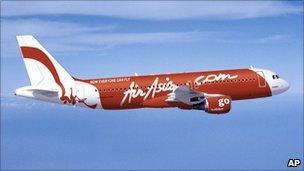How Air Asia founder Tony Fernandes' dream came true
- Published
When the music industry failed to adapt quickly to the internet, Tony Fernandes decided to make a clean break. He left his job to pursue a childhood dream: set up an Asia's first low cost airline.
Mr Fernandes bought Air Asia from a Malaysian government-owned company in September 2001 for a mere 25 pence.
"When the music business failed to embrace the internet, I thought it was game, set and match for the industry and I quit," he recalls. But he had no experience of running an airline.
"It really was a little bit of stick your finger in the air and hope for the best. But we were good marketing people from the music business… we just went out there and felt the market and said if you halve the fare, there's a huge enormous untapped market."
Air Asia was heavily indebted at the time. Fernandes set about reforming the airline as a short-haul low cost carrier, similar to those operating in the West. The decision revolutionised short-haul flights around Asia and Fernandes saw his business expand rapidly.
The company grew from two planes in 2002 to a fleet of 86 aircraft flying 30 million people around the world.
Separation
He puts the turnaround of the airline down to 'culture, focus and discipline'.
Mr Fernandes believes the trick is to be single-minded about the operation and to keep it simple. After the success of Air Asia's short-haul flights he expanded into long haul journeys with a new airline, Air Asia X.
The result was two separate companies, one dedicated to low cost short-haul flights, the other focusing on long-haul routes.
There are "two separate management teams, two separate marketing teams, and the two brands Air Asia and Air Asia X." The separation continues even on the plane.
"We have two separate sets of crew, two separate sets of pilots and engineers. So it's a very different culture but they're symbiotic without being parasitic and being on top of each other," he explains.
Despite this, the two airlines utilise a similar modus operandi: efficiency is key to keeping up with demand and ensuring a healthy profit-margin.
"Turnaround [of planes] is very critical. We do a lot of practising on doors, on the cabin crew, helping people sit down quickly and clearing the aisles."
Mr Fernandes first envisioned cheap flights across Asia as a young boy. Being at boarding school in Epsom in southern England far from his childhood home in Malaysia meant that half-term visits were out of the question.
"I always dreamt about doing a long haul low-cost airline," he remembers. "For my first ever flight in Air Asia X, I refused to do the launch to Australia and China and everyone thought it was a bit odd. But I wanted my first flight to be London-Kuala Lumpur."
"It was very emotional for me 35 years on."
Ground experience
Fernandes adopts a 'walk around' management style.
"If you sit up in your ivory tower and just look at financial reports, you're going to make some big mistakes."
For a few days every month he works on the ground or in the cabin crew. He says he's learned a lot from working on the airline himself.
"When we moved from the 737 to the Airbus, the Airbus is slightly higher off the ground and my guys said we need belt loaders. It would have cost us about a million US dollars. We used to just put the bags manually into the cargo hold on a 737."
So Fernandes turned the idea down. But on his next stint working alongside staff, he says he almost 'broke his back' loading the plane.
"I said 'Ron, you're right, we'll get belt loaders'… I made the decision instantaneously.' He says that without the experience, "I could have made a decision - a very wrong decision that damaged a lot of people and destroyed the morale of the organisation at that level."
Employees before customers

Air Asia and Air Asia X fly to 13 destinations in Asia, Europe and Australia
Fernandes says that to him "employees come number one, customers come number two. If you have a happy workforce they'll look after your customers anyway."
"We have a culture department whose sole job is to organise parties."
He has been known to search out new staff in queues. "I look for people who have drive, who have ambition, who are humble. I've hired many people at very strange places."
"You can have all the money you want in the world, and you can have all the brilliant ideas but if you don't have the people, forget it."
Succession planning
But Tony Fernandes admits that despite this, being a central presence in an organisation can have an inhibiting effect.
"The one bad thing about Asian companies and family owned companies and those started by entrepreneurs is: when do they move?"
"Good leadership is to know when to go and you only succeed as a good leader if you've transported someone else in and the company gets stronger. Then you've succeeded as leader."
The founder of Air Asia says he's not about to leave just yet, but is certain he won't make that mistake.
"We're nine years old and there's a few things more that have to be done but there are lots of young people coming in, lots of energies coming in. I'm very, very confident that when I do go, and my sell-by date does come, the company will still grow from strength to strength and then I would have said I've succeeded."